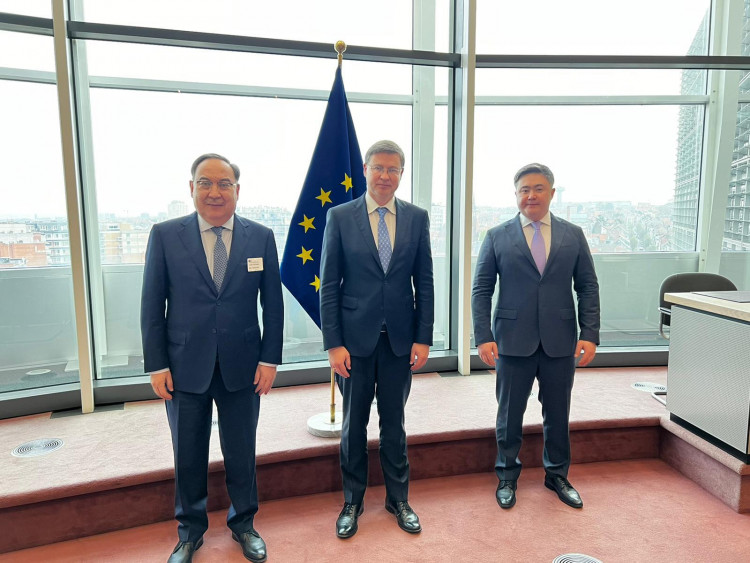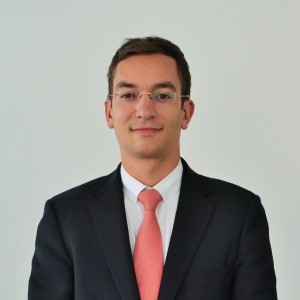This week has seen a flurry of high-level visits from Kazakhstan to Brussels, with one clear message: Kazakhstan – EU relations matter and are ready to be taken to the next level. First Deputy Chief of Staff of the President Timur Suleimenov; Special Representative of the President for International Cooperation Erzhan Kazykhan; Human Rights Commissioner and Ombudsperson Elvira Azimova and Deputy Foreign Minister Roman Vassilenko all paid a visit to the EU capital this week. They discussed with EU officials ways to further enhance the economic, energy, transport, and strategic partnership and mitigation measures for the possible negative impact of the EU’s Russia sanctions on the Kazakh economy; and offered clarity to EU counterparts on the ongoing investigations into the January events.

Timur Suleimenov, First Deputy Chief of the Presidential Administration, and Erzhan Kazykhan, Special Representative of President of Kazakhstan for International Cooperation, during meeting with Valdis Dombrovskis, who serves as Executive Vice President of the European Commission for An Economy that Works for People. Photo credit: akorda.kz
Not less important, their visit served to inform and garner EU support for the reforms announced by President Tokayev on March 16. At a hybrid event hosted by Euractiv, Deputy Foreign Minister Roman Vassilenko outlined the key elements of this reform agenda to the expert community and the broader public: de-monopolization and de-oligarchization of the economy; building an economy with a strong safety net in which no citizen is left behind; formation of a new political culture in the country through gradual democratization of the political system all the way down to the local level; and strong commitment to a multi-vector foreign policy regardless of the rapidly fluctuating external geopolitical environment.
The visit of Elvira Azimova was primarily focused on meeting with representatives from the European Parliament, the EU institution which in January hastily and without due consideration of all relevant facts passed a (non-legally binding) resolution highly critical of Kazakhstan.

Alberto Turkstra.
In a positive sign from the European Parliament’s openness to dialogue with Kazakh counterparts, Human Rights Commissioner Azimova was able to meet with Members of the European Parliament from across the political spectrum and representing various committees, including Legal Affairs; Foreign Affairs; Labour and Social Affairs as well as the Subcommittee on Human Rights. Human Rights Ombudsperson. Azimova assured her interlocutors that her office will continue pushing for transparent investigations and guaranteeing the rights of defendants, from arrest to trial.
In a briefing at the Brussels Press Club, Ms Azimova touched upon the relevant provisions of Kazakhstan’s reform process in the legal and human/civil rights spheres, and the lessons learnt from the tragic January events which threatened the integrity and stability of the country. She admitted that, amidst the chaos during the early days of January which caught law enforcement agencies unprepared, there were cases of unjustified detention and occasional failures to provide timely and high-quality legal assistance to detainees, as well as the use of torture and unlawful methods of investigation, all of which is the subject of thorough investigations.
Human Rights Commissioner Ms Azimova also said to be encouraged by the reforms announced by President Tokayev in his historic speech of March 16. In particular, President Tokayev announced that her function – as well as the Prosecutor General – will be given additional powers, including the right to appeal to the Constitutional Court, in addition to the President and the Parliament. It should be noted that President Tokayev, by announcing the creation of a Constitutional Court to replace the Constitutional Council (an institution which all too often has been made susceptible to executive capture), is aiming to increase the independence of the judicial branch.
Burgeoning Kazakhstan – EU ties
The sequence of high-level visits from Kazakhstan serves as reminder that Kazakh – EU ties are truly burgeoning. The EU is Kazakhstan’s largest investor and trading partner and a leading sources of investment. Out of a total of USD 370 billion invested in Kazakhstan so far, USD 160 billion came from EU Member States. Kazakhstan is also the leading trade partner of the EU in the Central Asian region, with a total annual volume of bilateral trade approximately USD 24 billion. The cornerstone of cooperation is the Enhanced Partnership and Cooperation Agreement (which entered into force in March 2020) and which covers 29 areas of cooperation from trade and investment, to science and tourism.
One of the most promising areas of cooperation is the transition to a green economy and carbon neutrality, which both sides aim to achieve by mid-century (the EU by 2050, Kazakhstan a decade later). At an event organised at the European Parliament by the Institute for Transitions and MEP Christophe Grudler, and attended by Deputy Foreign Minister Roman Vassilenko, the state of play of the EU Emissions Trading Scheme (ETS) and the Carbon Border Adjust Mechanism (CBAM) was discussed as well as the implications for third countries such as Kazakhstan.
Mr Vassilenko briefed the audience on the long-term green goals of Kazakhstan. From 2040 onwards Kazakhstan plans to actively use low-carbon technologies, such as carbon capture and storage, to expand the share of renewable energy sources to 83% by 2060 and stop generating heat from coal generation after 2050. By 2030, Kazakhstan to increase the share of renewable energy sources to 24% (instead of the previously planned 10%) and reduce the share of coal generation from the current 69% to 40% by 2030. Furthermore, by 2025, two billion trees will be planted, which will absorb more than 20 million tons of CO2 emissions by 2030. These measures will allow to gradually achieve the goals of the Paris Agreement. Similarly to some EU Member States, such as France, Kazakhstan is also considering nuclear energy to facilitate and accelerate Kazakhstan’s transition to a low-carbon economy.
For an economy long dominated by raw materials, these are very ambitious pledges. To become carbon neutral by 2060 will require substantial investments and wide range application of green technologies and innovations. EU companies are already active in this field. For example, earlier last month Italian giant Eni inaugurated its second wind farm in the country (Badamsha 2) in the region of Aktobe. In another example, German-Swedish renewable energy consortium Svevind Energy has signed a Memorandum of Understanding (MoU) with Kazakhstan’s Invest National Company to develop a green hydrogen complex.
The EU’s “Fit-for-55 package”, which seeks to revise the entire EU climate and energy framework by 2030, especially the revision of the EU’s ETS and the introduction of the CBAM in 2023, will have significant impact on trade between Kazakhstan and the EU. This is a source of concern in Kazakhstan, which is awaiting the roles and goods that will fall under such tax. As a major exporter of raw materials and carbon-intensive goods to EU, it will change the Kazakh strategy in this area but also bring new opportunities (such as green hydrogen, as mentioned above). It will therefore be paramount for Kazakhstan and the EU to work closely on mitigation of possible negative consequences on bilateral trade and key industries. It is for this reason that Kazakhstan is looking to create similar conditions at home to avoid taxation at the EU border, and to model its own ETS – in place since 2013 – more closely with the EU ETS.
Another important item on the Kazakhstan-EU agenda this week was connectivity and securing unhindered trade and logistics routes. It is well known that Kazakhstan plays a crucial role as a land-bridge connecting Europe and Asia. Kazakhstan has been actively working on the development of reliable, efficiency secure transit infrastructure, the realisation of which would benefit Europe’s trade with Asia. There are currently 11 international transit corridors passing through the territory of Kazakhstan. On January 25, President Tokayev announced plans to invest USD 20 billion by 2025 in diversification of transit and transport routes, and will launch new land corridors. This plan of action is very much aligned with the vision of the EU as outlined in two key documents: The 2019 EU-Asia Connectivity Strategy and the more recent Global Gateway strategy.
If there is one lesson derived from the COVID-19 pandemic and the ongoing disruption brought about by sanctions on Russia; that is the importance of diversifying supply chains and trade routes. Indeed, one of the goals of the Global Gateway strategy is the implementation of “transport infrastructure projects that foster the sustainable development of partner countries as well as enable the diversification of their supply chains”.
The Global Gateway strategy aims to mobilise up to EUR 300 billion in investments. Specific financial allocations have recently been announced for Africa (EUR 150 billion), but not yet for Central Asia. Now would be a good time, especially considering that Central Asia is mentioned as one of the three priority regions in the Global Gateway strategy, and to help the region soften the collateral damage of the EU’s crippling Russia sanctions on their economies.
It is in the strategic interests of both Kazakhstan and the EU to increase the capacity of the Trans-Caspian International Transport Route (also referred to as the Middle Corridor) and enhance its standing in the global transport logistics system. Increasing the cargo passage through the Aktau and Kuryk seaports located on the Caspian shores can help ensure uninterrupted transportation of goods to European countries. The route has plenty of potential for growth since, until date, Kazakhstan’s ports had been operating at a fraction of their capacity and can easily absorb extra cargo.
In conclusion, this week’s multiple high-level visits from Kazakhstan to Brussels and the dense bilateral agenda covered signal the healthy state of Kazakhstan-EU relations, and openness to engage in dialogue across the entire range of relevant agenda items without preconditions. The package of reforms recently announced by President Tokayev, which will modernise both the economy and the country’s political system, will certainly open many more doors for closer cooperation between both sides.
The author is Alberto Turkstra, a Central Asia expert and Project Manager of the Diplomatic World Institute (Brussels, Belgium).

